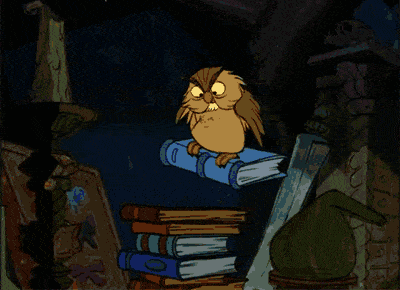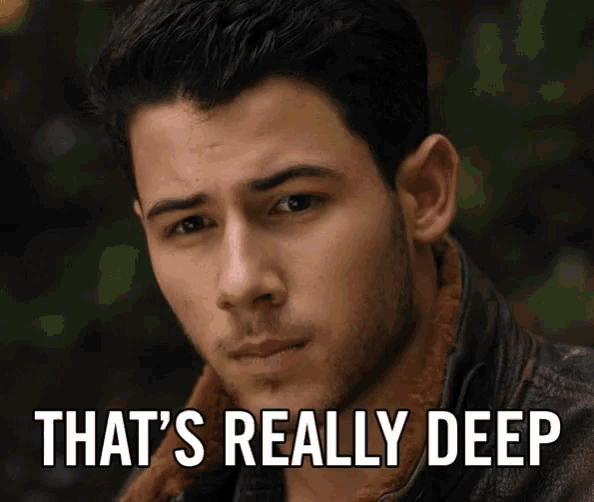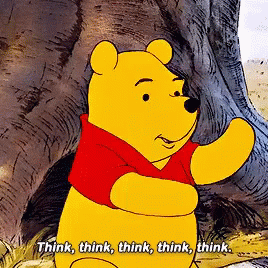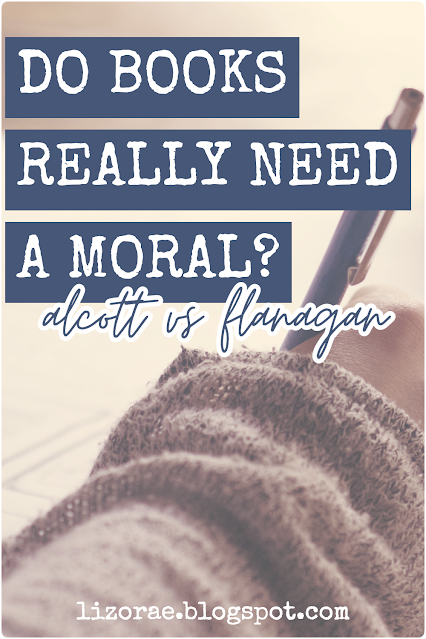Do Books Really Need A Moral?
Yeah, yeah, we've all heard that we should add a moral to our stories to make it good. It's just so cheesy. And it's hard work. And opens you up to criticism. Who listens to it anyway?
To that I say, all good points.
I can watch something with absolutely no and here's the moral of the story, kids! and still like it. Let's be real, we all can.
Is it really necessary to have a message?
There may be some spoilers from the Ranger's Apprentice and Little Women series.
During quarantine, I've been reading John Flanagan's books and the Little Women saga. Quick: comment your favourite characters. Either or all series!
They're on completely opposite sides of the theme spectrum. Flanagan's books have almost no moral and Little Women borders preachy. I love both series, but is there a difference?
Oh absolutely.

Ah. Books. They can be used as pictures, fire kindling and makeshift shields. Personally, I haven't heard of books saving someone's life in a physical sense, but I'm willing to bet it has. Books are lifesavers!
As both an author and reader, I'm not ashamed to admit it hurts me to see books mistreated. But when it (theoretically) comes between saving my life or saving my book, whether the book has a moral or not will be a deciding factor.
If the book doesn't have a moral, I'm using it to protect me. If it does have a moral, that book is precious. I'm protecting it.
A book without a moral is entertainment. A book with a moral is a story. Stories are precious and must be defended at all costs.
(Short disclaimer: I said that, but it's based on a quote by someone I don't remember. If you know, please leave a comment!)
Herman Melville accurately expresses how important theme is with:
Now the question is: how does theme make this difference?
Looking back on my works, the ones that were said to be the "deepest" had some kind of moral. Ignoring the fact that the morals aren't as good as they could be, it's safe to say that the better the moral, the deeper your story is.
The Little Women saga has changed me and I'm unashamed to admit it. Growing up with similar beliefs, it didn't dramatically mutate my life, but I appreciate even small differences.
This change only happened in two steps.
The first step follows along with what I said earlier on thinking subjectively and objectively about what you're teaching. Ask yourself if the message helps improve an aspect of life. The truer the message, the more likely it is for the reader to make the decision to follow through.
Step two is all up to the reader. Make it easier for them by striking a chord in their hearts that compel them to apply the moral.
It's an honour to be the one who everyone's pointing at. Writing a good moral is a two-edged axe. Only this axe is made of marshmallows. Your reader becomes a better person and you get to see the impact your book has as well as the motivation and self esteem boost.
Like when I have the moment of connection with a book and share it, other people will share your book too. Basically, you get free advertising. More exposure means more people will buy your book and the more bread you get on your table.
Lots of people have said this before, but I'm going to repeat it. Don't write in a moral for the sole purpose of financial purpose. I won't say writing for money is bad, because I understand that we need money to live.
Instead, focus on the effect. Imagine how people react to your message. Being the "impact character" to someone else is definitely something to be proud of.
The Little Women series has many morals. Each of the four books has something new to learn, from self improvement to parenting. From the first book, Little Women, there's chapters straight out teaching us overcoming shyness, humility, beating a hot temper and being content. For me, the biggest lesson was that sometimes, it's okay to not fight. If you've read any of the books from this series, leave a comment with the best thing you've learnt from it.
John Flanagan's books have impressed a code of chivalry, but on the whole, I can't say it has a big impact on me. I don't mean to attack his books. His three series, Ranger's Apprentice, Brotherband and The Royal Ranger, are by far some of the most accurate books I've read on archery and other survival tricks. But let's be honest, these skills aren't going to affect my day to day life.
Except if you say that Halt isn't the best character. If you do, I'll be using everything I've learnt about unseen movement to bring you down. In my mind, because I'm not that physically active.
To that I say, all good points.
I can watch something with absolutely no and here's the moral of the story, kids! and still like it. Let's be real, we all can.
Is it really necessary to have a message?
There may be some spoilers from the Ranger's Apprentice and Little Women series.
They're on completely opposite sides of the theme spectrum. Flanagan's books have almost no moral and Little Women borders preachy. I love both series, but is there a difference?
Oh absolutely.
The unconscious effect: A difference in treatment
Action scenes are epic, especially when they use objects most people would overlook and use it against the enemy. Spoons, bandanas, paper towel rolls are some objects. But forget those, I'm using books. *slaps books on table*
Ah. Books. They can be used as pictures, fire kindling and makeshift shields. Personally, I haven't heard of books saving someone's life in a physical sense, but I'm willing to bet it has. Books are lifesavers!
As both an author and reader, I'm not ashamed to admit it hurts me to see books mistreated. But when it (theoretically) comes between saving my life or saving my book, whether the book has a moral or not will be a deciding factor.
If the book doesn't have a moral, I'm using it to protect me. If it does have a moral, that book is precious. I'm protecting it.
A book without a moral is entertainment. A book with a moral is a story. Stories are precious and must be defended at all costs.
(Short disclaimer: I said that, but it's based on a quote by someone I don't remember. If you know, please leave a comment!)
Herman Melville accurately expresses how important theme is with:
To produce a mighty book, you must choose a mighty theme. No great and enduring volume can ever be written on the flea, though many there be that have tried it.
Now the question is: how does theme make this difference?
5 Ways Morals Are Special
1. Morals add depths.
In a world where much of today's entertainment is shallow, any hint of deepness is like realising that diamond in your ring is real. Or finding a gold nugget in your backyard. Or better yet, receiving a lifetime supply of chocolate.
Back in the days of young writing, I sometimes show them to my friends. I wouldn't do that now because it's embarrassing, but for some reason past Liz didn't think so. The feedback I would receive without fail is it's so deep my head hurts! Apparently, past Liz liked thinking as much as present Liz. Maybe they shouldn't be judges of deepness considering their entertainment taste.
 |
| Source: Tenor |
Looking back on my works, the ones that were said to be the "deepest" had some kind of moral. Ignoring the fact that the morals aren't as good as they could be, it's safe to say that the better the moral, the deeper your story is.
People appreciate deepness. Stories with meaning are anchors during storms. One of the best things on social media is seeing fandoms explode over how they never realised that x is a representation of y or that this character echoes a massive, philosophical thought.
I have a Google Keeps tag dedicated to these thoughts. Whether I'm good at remembering to write them down is another story, but the point I'm making is that people like thoughts. Thoughts are the backbone of life.
2. Morals are thought provoking.
As much as I love writing, thinking for hours and exploring abstract ideas would probably be all I'd do if it put bread on my table. *cough* INFJ *cough* Unfortunately, it does not help my financial situation. Because of this, I spend my days working, free time for writing and night times wandering through the world of the unconscious and formless.
 |
| The depths of my thoughts. Source: Giphy |
I have a Google Keeps tag dedicated to these thoughts. Whether I'm good at remembering to write them down is another story, but the point I'm making is that people like thoughts. Thoughts are the backbone of life.
Well written morals have a way of becoming obvious, even if it starts off being subconscious. The subconscious has a way of becoming conscious. Craig D Lounsbrough points out,
“Once I realise that the tune I’m whistling in my head is the theme that’s driving my heart, I suddenly realise that the most important question I can ask is, “What are the lyrics?”
It's just as true for authors. The stronger and more inherent the moral is to the story, the easier it is for readers to pick it apart. Intentionally or unintentionally, readers will start turning the moral over in their head.
And they remember it.
3. Morals click with people's hearts.
I have a lot of books I like to read. I have many favourite series I'll read over and over again. My favourite books are the ones I'll say you should read it! But the only books I'll practically force you to read are the books nearest to my heart. These are the books that have some kind of meaning that connects with my soul.
The difference between you should read it and you have to read it is all to do with the theme. Entertainment is enjoyable. I'll still hold my breath over epic action scenes with no other purpose than to be exciting. I'll still pick favourite characters even if they aren't teaching any morals. But I won't root for any couples or cry over any deaths.
Playing matchmaker and tears are saved for the characters that I connect with. The ones who represent a lesson. This is why I didn't cry over Alyss's death but I cried buckets over Beth and Dan's deaths in their respective books.
The "clicking" part of this process requires two steps. Firstly, have a moral (duh). Secondly, the moral has to be in line with the reader's values. The only thing you can really do is to think as long and hard as Pooh Bear. Observe whatever message you're trying to share both subjectively and objectively. From there, revise until you're happy, send it out into the world and hope for the best.
When the reader's morals and your message match up, it's absolutely magical. As a reader, the moment this happens is the moment I'm jumping to my messages and sharing the book with my fellow bookworms.
The "clicking" part of this process requires two steps. Firstly, have a moral (duh). Secondly, the moral has to be in line with the reader's values. The only thing you can really do is to think as long and hard as Pooh Bear. Observe whatever message you're trying to share both subjectively and objectively. From there, revise until you're happy, send it out into the world and hope for the best.
 |
| Source: Tenor |
When the reader's morals and your message match up, it's absolutely magical. As a reader, the moment this happens is the moment I'm jumping to my messages and sharing the book with my fellow bookworms.
4. Morals taken to heart are changed people.
The Little Women saga has changed me and I'm unashamed to admit it. Growing up with similar beliefs, it didn't dramatically mutate my life, but I appreciate even small differences.
This change only happened in two steps.
- The moral truly helps to improve life. In this case, I realised the morals Alcott teaches would actually make me a better person. I know that sounds corny but this series is a legend. It deserves this high praise.
- The conscious decision to apply it.
 |
| Source: Giphy |
The first step follows along with what I said earlier on thinking subjectively and objectively about what you're teaching. Ask yourself if the message helps improve an aspect of life. The truer the message, the more likely it is for the reader to make the decision to follow through.
Step two is all up to the reader. Make it easier for them by striking a chord in their hearts that compel them to apply the moral.
5. People point back to the source.
You might be wondering what Four has to do with you. To that I say, sit down on your favourite chair, make your favourite drink and enjoy the feeling that you've just changed someone's life. Yay!
That's not enough for you? Hmm? You want more?
Okay, okay.
(I'll admit, this joke works better in a live presentation or video than it does in text. If it can be called a joke in the first place.)
Notice how I used Little Women as an example of a book that has changed me? When people realise which book made what change, they point to the source. They point to your book. They point to you. This author changed my life with their book, The Greatus Book Of Greatusness.
 |
| Source: Tenor |
That's not enough for you? Hmm? You want more?
Okay, okay.
(I'll admit, this joke works better in a live presentation or video than it does in text. If it can be called a joke in the first place.)
Notice how I used Little Women as an example of a book that has changed me? When people realise which book made what change, they point to the source. They point to your book. They point to you. This author changed my life with their book, The Greatus Book Of Greatusness.
It's an honour to be the one who everyone's pointing at. Writing a good moral is a two-edged axe. Only this axe is made of marshmallows. Your reader becomes a better person and you get to see the impact your book has as well as the motivation and self esteem boost.
Like when I have the moment of connection with a book and share it, other people will share your book too. Basically, you get free advertising. More exposure means more people will buy your book and the more bread you get on your table.
Lots of people have said this before, but I'm going to repeat it. Don't write in a moral for the sole purpose of financial purpose. I won't say writing for money is bad, because I understand that we need money to live.
Instead, focus on the effect. Imagine how people react to your message. Being the "impact character" to someone else is definitely something to be proud of.
The Case Study
As a Lessons From The Media Post, it would not do to leave out the two pieces of media that inspired this post.The Little Women series has many morals. Each of the four books has something new to learn, from self improvement to parenting. From the first book, Little Women, there's chapters straight out teaching us overcoming shyness, humility, beating a hot temper and being content. For me, the biggest lesson was that sometimes, it's okay to not fight. If you've read any of the books from this series, leave a comment with the best thing you've learnt from it.
John Flanagan's books have impressed a code of chivalry, but on the whole, I can't say it has a big impact on me. I don't mean to attack his books. His three series, Ranger's Apprentice, Brotherband and The Royal Ranger, are by far some of the most accurate books I've read on archery and other survival tricks. But let's be honest, these skills aren't going to affect my day to day life.
Except if you say that Halt isn't the best character. If you do, I'll be using everything I've learnt about unseen movement to bring you down. In my mind, because I'm not that physically active.



Comments
Post a Comment